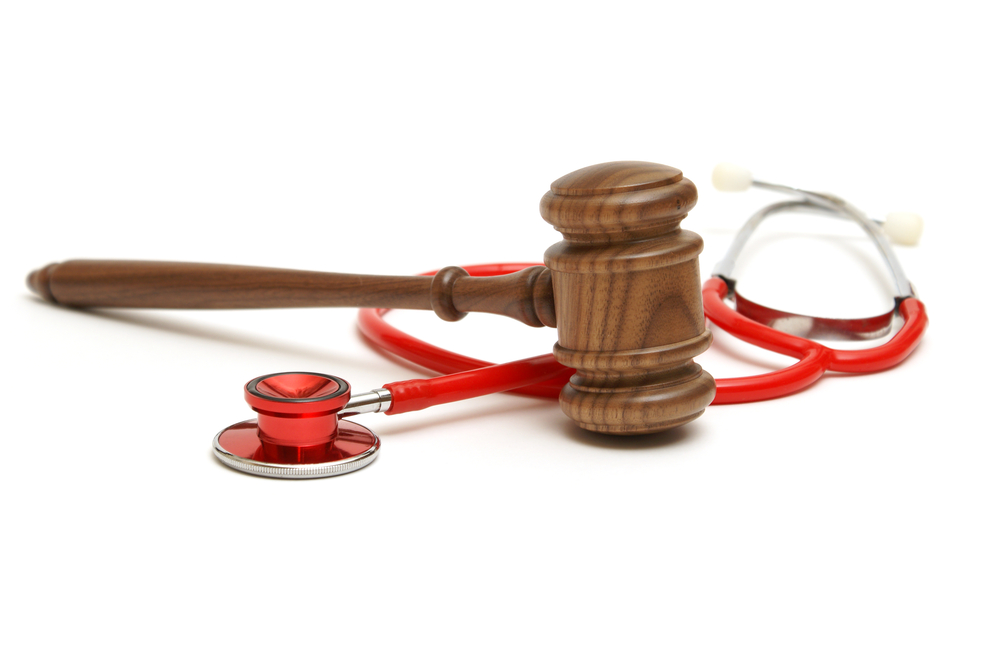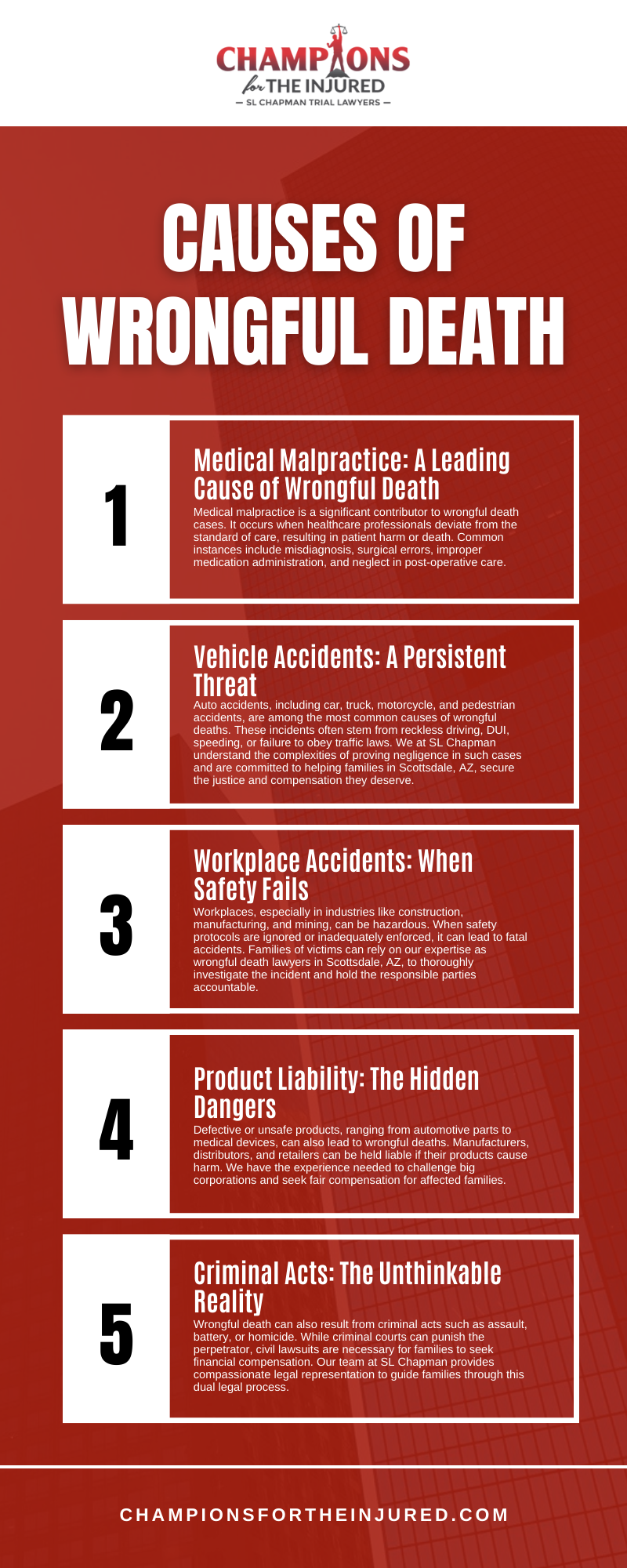Scottsdale Wrongful Death Lawyer
Scottsdale Arizona Wrongful Death Lawyer
In Scottsdale, Arizona, our team at SL Chapman specializes in handling wrongful death cases with the utmost professionalism and compassion. We understand the profound impact of losing a loved one due to someone else’s negligence or wrongful actions. Our collective expertise in Scottsdale’s legal landscape enables us to provide comprehensive legal support and guidance to families during these challenging times. We are committed to seeking justice and fair compensation, ensuring that the responsible parties are held accountable for their actions. At SL Chapman, we stand beside our clients every step of the way, offering a blend of legal acumen and empathetic support to navigate the complexities of wrongful death claims in Scottsdale.
Table of Contents
- Scottsdale Wrongful Death Laws
- Causes Of Wrongful Death
- Wrongful Death Infographic
- Who Can Sue For Wrongful Death In Scottsdale Arizona
- How Do I File A Wrongful Death Claim
- Steps To File A Wrongful Death Claim
- How Do I Prove Negligence In A Wrongful Death Case
- Gathering And Presenting Evidence
- FAQ’s
- Scottsdale Arizona Wrongful Death Lawyers, SL Chapman

Scottsdale Wrongful Death Laws
A Scottsdale, AZ wrongful death lawyer from our office can provide invaluable guidance in a difficult time.
It takes a foundational understanding of the law in order to provide some solace and clarity. In the unfortunate event of a wrongful death in Arizona, the state’s legal framework provides a pathway for the deceased’s family to seek justice and compensation. Understanding the specific laws related to wrongful death claims is essential for anyone navigating this difficult process.
Arizona’s Definition Of Wrongful Death
Arizona statute defines a wrongful death as one that is caused by “wrongful act, neglect, or default.” In essence, if the deceased could have pursued a personal injury claim had they survived, then the heirs or personal representative of the estate can bring a wrongful death action. These claims are civil suits, meaning they seek financial compensation rather than criminal penalties.
Who Can File A Wrongful Death Claim In Arizona
The law is specific about who is entitled to file a wrongful death claim. This right is reserved for the surviving spouse, children, parents, or the personal representative of the deceased person’s estate. If none of these parties are alive or capable, the right may extend to the deceased’s estate itself. Our Scottsdale wrongful death lawyer can assist in determining the appropriate party to file the claim.
Damages Recoverable
In wrongful death actions, Arizona law allows for the recovery of various damages. These include funeral and burial expenses, lost earnings and benefits that the deceased would have provided, and the loss of companionship for loved ones. Additionally, the pain and suffering endured by the deceased prior to death can also be compensated. The law aims to “fairly and justly” compensate the survivors for their loss, though no amount of money can truly replace a loved one.
Time Limits For Filing
The statute of limitations is a law that sets the maximum time after an event within which legal proceedings may be initiated. In Arizona, the statute of limitations for wrongful death claims is generally two years from the date of death. Missing this deadline could mean forfeiting the right to file a claim. This strict time limit underscores the importance of consulting with a lawyer as soon as possible.
Navigating The Legal Process
Wrongful death claims in Arizona involve a complex legal process, requiring a comprehensive understanding of the law and meticulous preparation of evidence. The claim must establish that the death was due to someone else’s negligence or intentional harm. This process typically involves investigations, negotiations with insurance companies, and possibly a trial.
Given the intricate nature of wrongful death claims, the expertise of a lawyer is often not just beneficial but essential. An experienced attorney can provide the necessary legal support to navigate the process, handle procedural complexities, and advocate for the maximum compensation on behalf of the bereaved family.
At SL Chapman Trial Lawyers, we understand the profound impact a wrongful death can have on a family. Our compassionate and experienced team is here to support you through this challenging time. If you’ve lost a loved one due to the negligence or misconduct of another, a specialist from our firm is prepared to help you seek justice. Contact us today to discuss your case with a Scottsdale wrongful death lawyer from our office.
Causes Of Wrongful Death
Wrongful death, a deeply tragic outcome, occurs when a person’s death is caused by the negligent, reckless, or intentional actions of another. As wrongful death lawyers based in Scottsdale, AZ, at SL Chapman, we are intimately familiar with the various causes of such incidents and the profound impact they have on the families left behind. This discussion aims to elucidate the primary causes of wrongful death and the legal avenues available for seeking justice and compensation.
Medical Malpractice: A Leading Cause of Wrongful Death
Medical malpractice is a significant contributor to wrongful death cases. It occurs when healthcare professionals deviate from the standard of care, resulting in patient harm or death. Common instances include misdiagnosis, surgical errors, improper medication administration, and neglect in post-operative care. Families facing such losses can find solace and support in consulting with skilled wrongful death lawyers in Scottsdale, AZ, like us at SL Chapman, who can offer expert guidance in navigating these complex legal waters.
Vehicle Accidents: A Persistent Threat
Auto accidents, including car, truck, motorcycle, and pedestrian accidents, are among the most common causes of wrongful deaths. These incidents often stem from reckless driving, DUI, speeding, or failure to obey traffic laws. We at SL Chapman understand the complexities of proving negligence in such cases and are committed to helping families in Scottsdale, AZ, secure the justice and compensation they deserve.
Workplace Accidents: When Safety Fails
Workplaces, especially in industries like construction, manufacturing, and mining, can be hazardous. When safety protocols are ignored or inadequately enforced, it can lead to fatal accidents. Families of victims can rely on our expertise as wrongful death lawyers in Scottsdale, AZ, to thoroughly investigate the incident and hold the responsible parties accountable.
Product Liability: The Hidden Dangers
Defective or unsafe products, ranging from automotive parts to medical devices, can also lead to wrongful deaths. Manufacturers, distributors, and retailers can be held liable if their products cause harm. We have the experience needed to challenge big corporations and seek fair compensation for affected families.
Criminal Acts: The Unthinkable Reality
Wrongful death can also result from criminal acts such as assault, battery, or homicide. While criminal courts can punish the perpetrator, civil lawsuits are necessary for families to seek financial compensation. Our team at SL Chapman provides compassionate legal representation to guide families through this dual legal process.
Navigating the Legal Path: How We Can Help
In the aftermath of a wrongful death, families often feel overwhelmed by grief and the complexities of legal proceedings. As wrongful death lawyers in Scottsdale, AZ, our role at SL Chapman is to shoulder the legal burden. We meticulously investigate each case, gather evidence, and build a compelling argument for compensation covering medical bills, funeral expenses, loss of income, and emotional distress.
The journey following a wrongful death is fraught with emotional and legal challenges. Understanding the causes and knowing there is legal support available can provide some solace. At SL Chapman, we are committed to guiding families in Scottsdale, AZ, through this difficult time with professionalism, empathy, and a relentless pursuit of justice. If you have suffered such an irreplaceable loss, we invite you to reach out to us for the support and representation you deserve.
Wrongful Death Infographic

Who can sue for wrongful death in Scottsdale Arizona
In the heartrending event of a wrongful death, knowing who is legally eligible to file a lawsuit is crucial. As experienced wrongful death lawyers in Scottsdale, AZ, our team at SL Chapman is dedicated to guiding families through this complex legal landscape. This comprehensive overview is designed to clarify who can sue for wrongful death in Scottsdale, Arizona, ensuring that families understand their rights and the support available to them.
Legal Framework in Scottsdale, Arizona
Under Arizona law, wrongful death claims are governed by specific statutes that define who can file these lawsuits. It’s essential to understand these legal nuances to ensure that the rights of the deceased’s loved ones are adequately represented and respected.
Immediate Family Members: Primary Claimants
In most cases, the immediate family members of the deceased are the primary claimants in a wrongful death lawsuit. This category typically includes spouses, children, and parents. As wrongful death lawyers in Scottsdale, AZ, we frequently assist these family members in seeking justice and compensation for their loss.
- Spouses: A surviving spouse can file a wrongful death lawsuit to seek damages for the loss of companionship, emotional distress, and financial support.
- Children: Minor children, and sometimes adult children, can sue for the loss of parental guidance, affection, and financial support.
- Parents: In cases where the deceased is a minor or an unmarried adult without children, parents can file a lawsuit for the emotional and psychological impact of their loss.
Extended Family and Financial Dependents
In certain cases, extended family members and financial dependents of the deceased may also have the right to sue. This often includes siblings, grandparents, or any other person who was financially dependent on the deceased. These claims can be more complex, and our role as wrongful death lawyers in Scottsdale, AZ, is to help navigate these intricacies.
Estate Representatives: Acting on Behalf of the Deceased
In some instances, the legal representative of the deceased’s estate may file a wrongful death lawsuit. This is particularly common when the deceased did not have immediate family members or when the family agrees to have the estate’s representative handle the lawsuit. The compensation awarded in such cases typically goes into the estate and is distributed according to the deceased’s will or state succession laws.
Understanding Damages and Compensation
The types of damages recoverable in a wrongful death lawsuit in Scottsdale, Arizona, vary. They can include medical and funeral expenses, lost income and benefits, loss of companionship, and pain and suffering experienced by the deceased before death. As your wrongful death lawyers in Scottsdale, AZ, we at SL Chapman can help quantify these damages and fight for fair compensation.
Our role at SL Chapman extends beyond legal representation. We provide compassionate support, understanding the emotional toll of wrongful death, and ensuring our clients’ rights are protected. From investigating the case to negotiating settlements or representing clients in court, we are committed to achieving justice for the deceased and their loved ones.
In the challenging journey following a wrongful death in Scottsdale, Arizona, understanding who is eligible to file a lawsuit is a critical first step. At SL Chapman, we pride ourselves on offering expert legal guidance and support to those navigating this difficult path. If you are considering a wrongful death lawsuit, we encourage you to reach out to us for a consultation, where we can discuss your specific circumstances and how we can assist in your pursuit of justice and closure.
How do I file a wrongful death claim
Filing a wrongful death claim can be a daunting and emotionally taxing process. As experienced wrongful death lawyers in Scottsdale, AZ, we at SL Chapman understand the intricacies involved in these claims. We’re here to provide a clear, step-by-step guide to help you navigate this process with as much ease and clarity as possible.
Understanding Wrongful Death Claims
A wrongful death claim is a legal action taken when someone dies due to the negligence or misconduct of another person or entity. These claims are intended to provide compensation for the survivors’ loss, which can include lost wages from the deceased, lost companionship, and funeral expenses.
Steps to File a Wrongful Death Claim
Determine Eligibility:
- Check if you are legally eligible to file the claim (e.g., immediate family members, financial dependents, estate representatives).
- Understand the relationship between your status and the deceased.
Gather Essential Documents:
- Obtain the death certificate of the deceased.
- Collect any relevant evidence related to the cause of death (e.g., medical records, accident reports).
- Document financial losses and emotional damages.
Consult a Wrongful Death Lawyer in Scottsdale, AZ:
- Seek legal advice to understand the viability of your claim.
- We at SL Chapman can provide a free consultation to assess your case.
File the Claim within the Statutory Deadline:
- Be aware of the statute of limitations in Arizona for filing a wrongful death claim.
- Ensure the claim is filed within this timeframe to avoid being barred from legal action.
Investigate and Build the Case:
- Conduct a thorough investigation of the incident.
- Collect and preserve evidence, witness statements, and expert testimonies.
- We can handle this aspect, utilizing our resources and expertise.
Calculate Damages:
- Determine the financial and non-financial losses incurred.
- This includes medical bills, funeral expenses, lost wages, loss of companionship, and emotional distress.
Negotiate with Insurance Companies:
- Engage in negotiations for a fair settlement.
- We have the experience to handle tough negotiations on your behalf.
Prepare for Litigation if Necessary:
- If a fair settlement cannot be reached, be prepared to take the case to court.
- Our team at SL Chapman is well-versed in litigating wrongful death cases.
The Importance of Legal Assistance
- Expertise and Guidance: As wrongful death lawyers in Scottsdale, AZ, we can offer expert legal advice and guide you through each step of the process.
- Emotional Support: We understand the emotional burden of a wrongful death claim and provide compassionate support throughout.
- Maximizing Compensation: Our goal is to ensure you receive the maximum possible compensation for your loss.
Filing a wrongful death claim is a complex process that requires careful attention to legal details and deadlines. As your wrongful death lawyers in Scottsdale, AZ, we at SL Chapman are committed to guiding you through this challenging time with professionalism and empathy. If you’re considering filing a wrongful death claim, we encourage you to reach out to us for support and expert legal assistance.
How Do I Prove Negligence in a Wrongful Death Case
When faced with the tragedy of a wrongful death, one of the most crucial aspects of seeking justice is proving negligence. As wrongful death lawyers in Scottsdale, AZ, at SL Chapman, we understand the intricacies of building a strong case to demonstrate negligence. This comprehensive guide aims to elucidate how to effectively prove negligence in a wrongful death case.
Understanding Negligence in Wrongful Death Cases
Negligence is the legal foundation for many wrongful death cases. It involves demonstrating that the death was a result of someone’s failure to act with reasonable care. Establishing negligence requires proving several key elements, each of which is crucial to the success of the case.
The Four Elements of Proving Negligence
Duty of Care:
- Establish that the defendant had a legal duty to the deceased.
- For instance, a doctor has a duty to provide standard medical care to patients, or a driver has a duty to obey traffic laws and operate their vehicle safely.
Breach of Duty:
- Show that the defendant breached this duty of care.
- This could involve demonstrating how a medical professional deviated from standard practices or how a driver was reckless or negligent.
Causation:
- Link the breach of duty directly to the death.
- It must be clear that the death would not have occurred but for the defendant’s breach of duty.
Damages:
- Prove that the death resulted in specific damages.
- This includes quantifiable items like medical bills and funeral costs, as well as non-economic damages like pain and suffering or loss of companionship.
Gathering and Presenting Evidence
Medical Records and Expert Testimonies:
- Collect medical records that show the cause of death.
- Utilize expert testimonies to establish how the standard of care was breached.
Accident Reports and Physical Evidence:
- In cases like vehicle accidents, obtain police reports and any available physical evidence from the scene.
- Photographs, videos, or witness statements can be pivotal.
Documentation of Damages:
- Compile documentation of all related expenses and impacts.
- Financial records, employment records, and personal testimonies can illustrate the extent of the damages.
Proving negligence in a wrongful death case requires a detailed and strategic approach. At SL Chapman, as wrongful death lawyers in Scottsdale, AZ, we are committed to providing the highest level of legal service to ensure that negligence is effectively proven and that our clients receive the justice and compensation they deserve. If you are navigating the complexities of a wrongful death case, we encourage you to reach out to us for professional and compassionate guidance.
Scottsdale Wrongful Death Statistics
According to the National Center for Health Statistics, in the United States, there are an estimated 2.4 million wrongful death cases filed each year. At our firm, we understand that no amount of money will ever make up for the loss of a loved one, but wrongful death lawsuits are often the only way for the victim’s family to obtain any kind of justice for their death.
If you have lost a loved one because of another party’s negligence or recklessness, contact our office to find out how you can obtain financial justice for your loved one’s death.
FAQ’s:
Who is a beneficiary of a wrongful death claim?
A beneficiary of a wrongful death claim typically refers to individuals who are legally entitled to receive compensation due to the death of a loved one caused by another’s negligence or wrongdoing. In Arizona, including Scottsdale, beneficiaries commonly include the deceased’s surviving spouse, children, parents, or guardians. Additionally, if these immediate family members are not present, a personal representative of the deceased’s estate can also be considered a beneficiary and may file a claim on behalf of the estate.
What is the average wrongful death settlement in Scottsdale, Arizona?
The average wrongful death settlement in Scottsdale, Arizona, can vary significantly based on the specifics of each case, such as the severity of negligence, the circumstances of the death, and the damages incurred. Factors like medical expenses, funeral costs, loss of future earnings, pain and suffering, and loss of companionship are considered. While it’s difficult to provide a precise average without current data, settlements can range from thousands to millions of dollars. Consulting with a local attorney can provide a clearer picture based on recent cases and trends in the area.
What is the statute of wrongful death in Arizona?
The statute of wrongful death in Arizona refers to the legal framework that governs wrongful death claims, including who can file a claim, the damages that can be sought, and the time frame in which the lawsuit must be filed. One critical component is the statute of limitations, which in Arizona is generally two years from the date of the person’s death. This means that beneficiaries have a two-year window to initiate a wrongful death lawsuit, or they risk losing their right to seek compensation.
What is the burden of proof for wrongful death?
The burden of proof for wrongful death typically rests on the plaintiff (the party bringing the claim). This means that the beneficiaries or their legal representatives must prove that the defendant’s negligence or wrongful actions directly resulted in the death of their loved one. In civil cases like wrongful death claims, the standard of proof is “preponderance of the evidence,” which means it’s more likely than not that the defendant’s negligence caused the death. This is a lower standard than the “beyond a reasonable doubt” criterion used in criminal cases.
Are wrongful death settlements taxable in Arizona?
In general, wrongful death settlements in Arizona, as in most states, are not considered taxable income for federal or state income tax purposes. The IRS typically does not tax compensation received for physical injury or physical sickness, and wrongful death falls under this category. However, there are exceptions. For instance, if the settlement includes interest or punitive damages, those specific portions might be taxable. Additionally, if the deceased had accrued medical expenses that were previously deducted from taxes, and these expenses are later reimbursed through the settlement, that portion might be taxable. It’s always advisable to consult with a tax professional or accountant to understand the specific tax implications of a settlement.
Scottsdale Arizona Wrongful Death Lawyers, SL Chapman
17470 N Pacesetter Way, Scottsdale, AZ 85255
Schedule Your Consultation With SL Chapman Today
In Scottsdale, AZ, the realm of wrongful death claims is both intricate and emotionally taxing, and at SL Chapman, we are deeply committed to guiding our clients through this challenging journey. Our team, with its extensive knowledge and compassionate approach, stands ready to provide the legal expertise and support necessary to navigate the complexities of wrongful death cases. We understand the profound impact of losing a loved one due to another’s negligence and strive to ensure that justice is served, offering our clients a sense of closure and financial security. In these difficult times, we at SL Chapman are your steadfast allies, dedicated to upholding your rights and honoring the memory of your loved ones with the dignity and respect they deserve.


